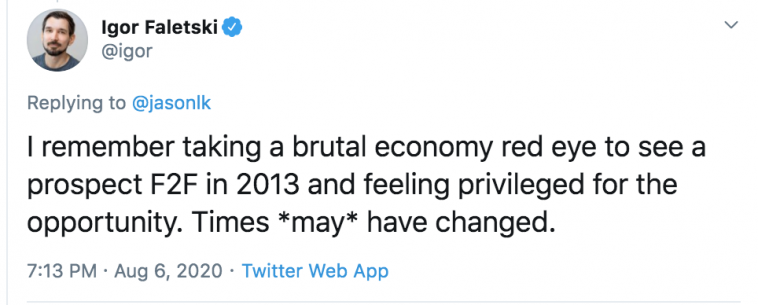- Like
- SHARE
- Digg
- Del
- Tumblr
- VKontakte
- Flattr
- Buffer
- Love This
- Save
- Odnoklassniki
- Meneame
- Blogger
- Amazon
- Yahoo Mail
- Gmail
- AOL
- Newsvine
- HackerNews
- Evernote
- MySpace
- Mail.ru
- Viadeo
- Line
- Comments
- Yummly
- SMS
- Viber
- Telegram
- JOIN
- Skype
- Facebook Messenger
- Kakao
- LiveJournal
- Yammer
- Edgar
- Fintel
- Mix
- Instapaper
- Copy Link
Q:As a founder of a series A startup, was it unreasonable for me to use the company’s money for first class tickets? A European company was interested in doing a 7-figure deal with us and I paid $32k for 4 first class tickets. My VC is now mad at me.
Is $32k a fair investment to bring in a 7 figure deal? Of course.
Your logic is sound, or at least, not unsound.
But here’s the thing. Capital is expensive, scarce and precious in start-ups. And you have an implicit and often explicit fiduciary duty to spend it carefully.
That generally means the following:
- In the early days, things should be run in “waste nothing mode” until the business is well funded and on sound footing. This might mean taking the cheapest possible flight.
- When the business is established but not yet at scale, “the low end of normal” is what’s expected by all stakeholders. You can start to spend for convenience, because it’s efficient. Up to a point. This might mean unrestricted coach, a decent hotel, etc. Definitely an office manager and likely an executive assistant. But not first class.
- When the business is at scale and unstoppable, then it’s OK, to a point, to pay significant money for leverage. Even 2 executive assistants might make sense. An extra office to make travel easier. Hire a recruiter to help manage candidate flow. Make sure you have an amazing, comfortable home office set-up. Take Uber or Lyft whenever and wherever it saves you time as CEO. And maybe. Maybe. Sometimes. First class. Maybe.
- And you always have to set an example. For the team, for your investors, for your employees and customers. Even an appearance of profilgacy or waste is wrong. If it feels wrong — it is wrong.
So if you are profitable and growing nicely, or just raised $100m and are growing like a weed, it might make sense, sometimes, to go First Class to close that big deal. Or Business Class maybe is more prudent.
But that ain’t where you are at Series A.
Look, Marc Benioff flies his private jet to meet customers. But he pays for it out his own pocket.
It is important that once you have significant capital, you use it for leverage. You use it to get help. To hire VPs, and to spend where you can to grow faster. Don’t underspend and waste your time as CEO, once you are at scale. Stop taking out the garbage yourself as early as you can. Take the easier flight, stay at a decent hotel, once the costs there are immaterial. Take the team out, too. They deserve it.
But you have to know where to set an example, and how to show respect for the capital you’ve been given.



